 For the second time in a fortnight, coastguards have been scrambled after a digital TV box sent out a signal on a wavelength used by ships in distress.
For the second time in a fortnight, coastguards have been scrambled after a digital TV box sent out a signal on a wavelength used by ships in distress.
Mrs Donaldson, a 67 year old pensioner in Plymouth, Devon, came back from an evening at the cinema to find investigators waiting outside her door, “holding a massive antenna.”
After picking up the ‘distress’ signal from Mrs Donaldson’s Freeview box, two lifeboats and a police launch spent a fruitless three hours searching 20 miles of coastline looking for what they believed to be a mystery vessel in trouble.
Two weeks previously, a faulty TV digital box in Portsmouth resulted in a coastguard helicopter from RAF Kinloss being scrambled for a two hour search of the harbour area before the signal was traced to a household inland.
RAF spokesman Michael Mulford confirmed that the Aeronautical Rescue Co-ordination Centre at Kinloss had detected the beacon – transmitting on the major emergency frequency – from one of five orbiting satellites.
Once the RAF had established that the source wasn’t coming from a nearby vessel or missing plane, they contacted Ofcom who were able to track the signal down to a household.
At the time, an Ofcom spokesman was reported as saying that the signal was a “real one-off”, adding that “digital boxes only receive signals.” When we spoke to Ofcom today, they claimed to have said it was ‘probably’ a one-off.
Beacons not boxes
The frequency used by the digital Freeview set-top box (officially called the Civil Distress Frequency) exactly matched the one reserved for emergency distress beacons.
These beacons are carried by ships, yachts and aircraft, and when they come into contact with water, automatically broadcast a signal that identifies the vessel and its location.
Will the digi-TV rollout be scuppered?
With Digital TV boxes being responsible for two major incidents in just two weeks, some serious issues are being raised for the proposed roll out of digital TV in the UK.
Ofcom officials told us that they think that only two boxes failing out of the ten million Freeview boxes already sold isn’t much of a problem.
But with the cost of the two wasted rescue operations exceeding what has been reported as £20,000, lifeboat crews have warned that such rogue signals could cost lives in the future.
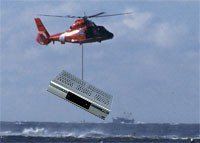 An Ofcom spokesman explained that the faulty boxes are now being examined for malfunctioning components, adding: “Apparently any device capable of receiving a signal can also send a signal if it malfunctions. To the best of our knowledge these are the only two out of millions of Freeview users in the UK to have experienced this problem.”
An Ofcom spokesman explained that the faulty boxes are now being examined for malfunctioning components, adding: “Apparently any device capable of receiving a signal can also send a signal if it malfunctions. To the best of our knowledge these are the only two out of millions of Freeview users in the UK to have experienced this problem.”
Confusingly they said that they hoped to have the results of the tests in a ‘couple of weeks,’ but might not make the findings public. They refused to be drawn on who made the Distressing digi-box, or indeed if both boxes were made by the same company. They also wouldn’t reveal the price range of the offending box.
Meanwhile, it looks like they’ll be no shiny digital future for Mrs Donaldson who has said that she won’t be getting a replacement box as she would “hate to cause more bother”. Bless.
 Anyone who’s anyone in the 3GSM world will be hot footing it to the 3GSM World Congress in Barcelona, which starts tomorrow.
Anyone who’s anyone in the 3GSM world will be hot footing it to the 3GSM World Congress in Barcelona, which starts tomorrow. The mobile phone industry is desperate to come up with mass market services to entice consumers to use 3G networks, but they’ve got their work cut out, with a recent survey finding that almost 80 per cent of UK users said that mobile services are getting too complicated.
The mobile phone industry is desperate to come up with mass market services to entice consumers to use 3G networks, but they’ve got their work cut out, with a recent survey finding that almost 80 per cent of UK users said that mobile services are getting too complicated. BT are also going to be at the show and are expected to launch their new broadcast digital TV to mobile service,
BT are also going to be at the show and are expected to launch their new broadcast digital TV to mobile service,  Major UK consumer broadband providers NTL are teaming up with BitTorrent, the developers of the world’s most popular peer-to-peer (P2P) application.
Major UK consumer broadband providers NTL are teaming up with BitTorrent, the developers of the world’s most popular peer-to-peer (P2P) application. Naturally, rights holders and movie heavyweights weren’t too chuffed to see their content whizzing around the Internet for gratis, and quickly hired in squadrons of lawyers to apply pressure on BitTorrent.
Naturally, rights holders and movie heavyweights weren’t too chuffed to see their content whizzing around the Internet for gratis, and quickly hired in squadrons of lawyers to apply pressure on BitTorrent.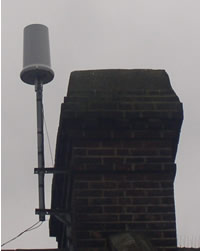 If you happen to be in Watford and are looking up at rooftops, you might see something resembling a inverted grey flowerpot stuck on some of the chimneys (see lovely pics). It’s highly lightly that these are basestations for a new wireless service that’s spreading through the town.
If you happen to be in Watford and are looking up at rooftops, you might see something resembling a inverted grey flowerpot stuck on some of the chimneys (see lovely pics). It’s highly lightly that these are basestations for a new wireless service that’s spreading through the town.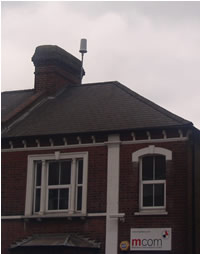 It’s based on a pre-ratified WiMAX standard and uses mesh networking. Thebase-stations communicate with each other, as well as end-users, providing resilience in the core network. If the wired connectivity from a base-station fails, it can re-route through another base-station, without loss of service.
It’s based on a pre-ratified WiMAX standard and uses mesh networking. Thebase-stations communicate with each other, as well as end-users, providing resilience in the core network. If the wired connectivity from a base-station fails, it can re-route through another base-station, without loss of service. One major advantage this wireless service has over ADSL is that it’s asymmetric service, meaning the upstream bandwidth is the same as thedownstream – ADSL receives more bandwidth than it can send. Symmetrical bandwidth may not mean much for casual Internetbrowsing, but is important for business and when offering voice services.
One major advantage this wireless service has over ADSL is that it’s asymmetric service, meaning the upstream bandwidth is the same as thedownstream – ADSL receives more bandwidth than it can send. Symmetrical bandwidth may not mean much for casual Internetbrowsing, but is important for business and when offering voice services. Since the service uses VoIP, lines can be added as needed. The basic services can be plugged into existing an PBX/Keysystem, this can be extended all the way to a hosted IP PBX runand maintained by MCOM.
Since the service uses VoIP, lines can be added as needed. The basic services can be plugged into existing an PBX/Keysystem, this can be extended all the way to a hosted IP PBX runand maintained by MCOM. Wikinews, the collaborative online journalism project spawned from Wikipedia, has been digging up more dirt on the Wikipedia edits made by Capitol Hill staffers.
Wikinews, the collaborative online journalism project spawned from Wikipedia, has been digging up more dirt on the Wikipedia edits made by Capitol Hill staffers.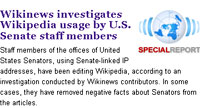 Hot on their trail, the meticulous volunteers at Wikinews collected every Senate IP which had ever been edited on Wikipedia (up to February 3) and examined where the IPs came, what was edited and what the edits comprised of.
Hot on their trail, the meticulous volunteers at Wikinews collected every Senate IP which had ever been edited on Wikipedia (up to February 3) and examined where the IPs came, what was edited and what the edits comprised of.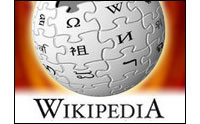 Open, collaborative information projects like Wikipedia and Wikinews have been welcomed by Internet activists keen to make unbiased information freely available, but the very nature of the project makes it wide open to abuse (as one pundit commented, “The information on your screen may be only as good as the most recent users’ motives.”)
Open, collaborative information projects like Wikipedia and Wikinews have been welcomed by Internet activists keen to make unbiased information freely available, but the very nature of the project makes it wide open to abuse (as one pundit commented, “The information on your screen may be only as good as the most recent users’ motives.”)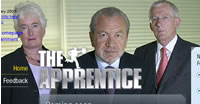 ‘The Apprentice’ TV show has been a smash hit in the UK, much the same as it was in the US. The BBC now plan to use it as the ‘first extensive broadband experience,’ as part of the BBC TV Plus project.
‘The Apprentice’ TV show has been a smash hit in the UK, much the same as it was in the US. The BBC now plan to use it as the ‘first extensive broadband experience,’ as part of the BBC TV Plus project.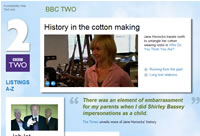 Initially looking at these advances it’s easy to get excited, but when looked in context of how long it’s taken, a frustrations come to the surface.
Initially looking at these advances it’s easy to get excited, but when looked in context of how long it’s taken, a frustrations come to the surface. (Funnily enough, after reading that article the person responsible for the project contacted us and it turned out to be someone whose previous work outside the BBC we’d been very impressed with.)
(Funnily enough, after reading that article the person responsible for the project contacted us and it turned out to be someone whose previous work outside the BBC we’d been very impressed with.)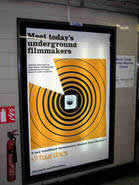 The easy way of getting “content” into a mobile phone, would be just to print 2D barcodes. However, Viacom Outdoor has started a rather more challenging experiment, fitting London Underground posters with Bluetooth transmitters.
The easy way of getting “content” into a mobile phone, would be just to print 2D barcodes. However, Viacom Outdoor has started a rather more challenging experiment, fitting London Underground posters with Bluetooth transmitters. Sky has announced three of its top Exec will be altering roles, we suspect, as they prepare to become more than just a satellite TV company.
Sky has announced three of its top Exec will be altering roles, we suspect, as they prepare to become more than just a satellite TV company. We think Mike Darcey sounds like he’s going to have the most fun, and certainly the most toys to play with.
We think Mike Darcey sounds like he’s going to have the most fun, and certainly the most toys to play with. After trying to cheat its way to the top of the search engine pile, BMW has been dropped from global search engine, Google.
After trying to cheat its way to the top of the search engine pile, BMW has been dropped from global search engine, Google.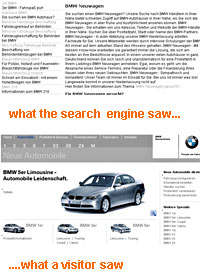 As he explains in his blog, search engine ‘bots’ arriving at the BMW site would see a page full of keyword-loaded text, which had been optimised to ensure a high search engine ranking.
As he explains in his blog, search engine ‘bots’ arriving at the BMW site would see a page full of keyword-loaded text, which had been optimised to ensure a high search engine ranking. BMW now have the dubious honour of becoming one of the highest profile companies to have a website effectively blacklisted by Google, by having their all-important PageRank reset to Zero (German camera manufacturer ricoh.de are also set to be delisted).
BMW now have the dubious honour of becoming one of the highest profile companies to have a website effectively blacklisted by Google, by having their all-important PageRank reset to Zero (German camera manufacturer ricoh.de are also set to be delisted). Now holding the record for the fastest-selling debut album in the UK, the success of young British indie-rockers Arctic Monkeys shows how the Web has changed both the way in which bands promote and market themselves and how people find new music.
Now holding the record for the fastest-selling debut album in the UK, the success of young British indie-rockers Arctic Monkeys shows how the Web has changed both the way in which bands promote and market themselves and how people find new music. For less than the cost of a handful of flyers, bands can set up their own Websites, offer free downloadable tunes, sell merchandise, maintain free email mailing lists and invite a dialogue with their fans.
For less than the cost of a handful of flyers, bands can set up their own Websites, offer free downloadable tunes, sell merchandise, maintain free email mailing lists and invite a dialogue with their fans. With a growing fanbase clambering for more, it wasn’t long before record companies were begging to sign up the band, and last week’s album release on Domino Records saw the Artic Monkeys record-breaking leap up the charts.
With a growing fanbase clambering for more, it wasn’t long before record companies were begging to sign up the band, and last week’s album release on Domino Records saw the Artic Monkeys record-breaking leap up the charts.